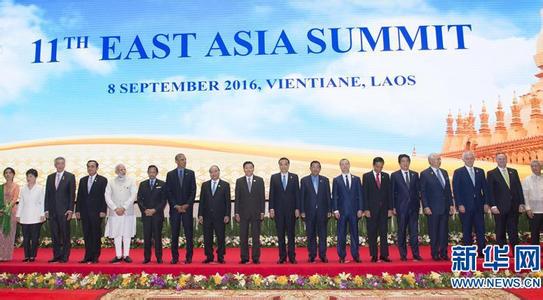李克强总理在第十一届东亚峰会上的讲话
Remarks by Premier Li Keqiang at the 11th East Asia Summit
来源:新华网 英文巴士 整理:泉州启航翻译公司
中华人民共和国国务院总理 李克强
H.E. Li Keqiang, Premier of the State Council of the People’s Republic of China
2016年9月8日,万象
Vientiane, 8 September 2016

尊敬的通伦总理,
各位同事:
Prime Minister Thongloun Sisoulith,
Dear Colleagues,
很高兴与各位同事在美丽的万象相聚。
It gives me great pleasure to join you in the beautiful city of Vientiane.
当前,世界政治经济格局正经历复杂深刻演变。全球经济增长乏力,贸易保护主义抬头,政治安全冲突和动荡、难民危机、恐怖主义等地区热点和全球性挑战加剧,推动世界经济稳定复苏、维护国际和平稳定的任务紧迫而艰巨。东亚地区仍然被视作远离战争冲突的“净土”和贸易投资较快发展的热土。我们正是在和平稳定的条件下才实现发展繁荣。这样的局面来之不易,值得各方倍加珍惜。
The world political and economic landscape is undergoing complex and profound changes. There has been anemic global growth, resurfacing trade protectionism, and increasing regional hotspots and global challenges such as political and security conflicts and turbulence, refugee flow and terrorism. All this makes it imperative and daunting to promote steady world economic recovery and maintain international peace and stability. In comparison, East Asia is still regarded as a land free of war and conflict and a land of robust growth of trade and investment. It is with such peace and stability that we have achieved development and prosperity. Such achievements are hard-won and should be doubly cherished by all sides.
自2005年成立以来,东亚峰会为增进各方理解与互信、促进地区和平稳定与发展繁荣作出了积极贡献。如今东亚峰会已迈入第二个十年。各方应珍惜和遵循东亚峰会积累的经验,把握正确方向,突出工作重点,推动东亚合作行稳致远。
Since its inception in 2005, the EAS has played a positive role in enhancing mutual understanding and mutual trust as well as regional peace, stability, development and prosperity. The EAS has now entered its second decade. Parties need to cherish and draw on the experience that the EAS has obtained, keep working in the right direction, highlight priorities, and secure steady progress for East Asian cooperation for the long run.
我们应继续坚持东亚峰会作为“领导人引领的战略论坛”定位,支持东盟中心地位,奉行协商一致、照顾各方舒适度等“东盟方式”,积极务实地推动对话合作。中方支持峰会机制建设,支持建立东盟秘书处东亚峰会小组。中方倡议由这一小组牵头梳理《落实〈金边发展宣言〉行动计划》的工作进展,适时启动制定第二期行动计划,推动峰会合作迈上新台阶。
We need to keep the EAS as a “leaders-led” strategic forum, support ASEAN centrality, adhere to the ASEAN way of building consensus and accommodating each other’s comfort level, and advance dialogue and cooperation in a positive and pragmatic way. China supports institution building of the EAS and the setting up of an EAS unit of ASEAN Secretariat. China hopes that the unit will coordinate efforts to review progress in the Plan of Action to Implement the Phnom Penh Declaration on the EAS Development Initiative and that the drafting of a second-phase plan of action will be started in due course, so as to take EAS cooperation to new heights.
经济发展合作与政治安全合作是驱动东亚峰会的两个“轮子”,应该相互促进、同步前进。
Economic development cooperation and political and security cooperation are the two wheels driving EAS forward. They should reinforce each other and advance in parallel.
在经济发展方面,一是大力支持地区互联互通。中方与老挝共同提议此次峰会发表《关于促进东亚基础设施发展合作的万象宣言》,旨在为区域一体化注入持久动力。中方愿与各方共同推动“一带一路”建设,发挥好亚洲基础设施投资银行、丝路基金等融资平台的作用,为地区互联互通建设提供资金支持。二是加快推进自贸区建设。中国和东盟正加紧推动自贸区升级有关议定书成果落地。中方将与日本、韩国共同推动中日韩自贸区谈判尽早取得阶段性成果。希望区域全面经济伙伴关系协定(RCEP)谈判尽快完成,同其他自贸安排相互促进,共同推进包容性的亚太自贸区建设。三是加强社会民生领域合作。中方将继续举办好东亚峰会清洁能源论坛和新能源论坛,推动相关技术和经验交流。中方将继续与地区国家积极开展教育政策对话,推动培训研修和语言文化交流合作。
In economic development: first, we need to vigorously support connectivity building in the region. China and Laos have jointly proposed a Vientiane Declaration on Promoting Infrastructure Development Cooperation in East Asia to be issued at today’s EAS with a view to inject enduring impetus to regional integration. China hopes to work with all parties to promote development of the Belt and Road Initiative. We could use such financing platforms as the AIIB and the Silk Road Fund to provide capital support for regional connectivity. Second, we need to speed up the building of FTAs. China and ASEAN are stepping up efforts to deliver the outcomes of the protocol to upgrade the FTA, and China, Japan and the ROK will work together for early progress in the negotiations of the trilateral FTA. We hope to see early conclusion of the RCEP negotiations so that the RCEP and other free trade arrangements will reinforce each other and promote the development of an inclusive FTA of the Asia-Pacific. Third, we need to strengthen cooperation in areas related to people’s well-being. China will ensure success of the EAS Clean Energy Forum and EAS New Energy Forum, and will facilitate sharing of relevant technologies and experience. China will continue to engage actively in education policy dialogue with countries in the region and will encourage cooperation in training programs and exchanges in language and culture.
在政治安全方面,中国坚持奉行大小国家一律平等、相互尊重的外交传统,倡导共同、综合、合作、可持续的新安全观,共同维护地区和平安宁。一是加强非传统安全合作。当前,恐怖主义、自然灾害、跨国犯罪、传染性疫病等非传统安全威胁日益凸显,成为地区国家面临的紧迫安全挑战。中方愿与各方加强合作,共同应对。2012年以来,中国和美国、联合国相关机构等方面举办了五次东亚峰会地震应急演练,明年将举办第六次。中方将于明年举办东亚峰会海上搜救经验交流研讨会。二是探讨区域安全架构建设。东亚峰会作为战略论坛,应高度重视区域安全架构问题,创新地区安全理念,构建反映地区现实、符合各方需求的区域安全架构。中方欢迎泰国明年主办东亚峰会第六届区域安全架构研讨会,也愿积极考虑举办“二轨”研讨会。三是妥善处理热点敏感问题。本地区国家比邻而居,就像舌头和牙齿难免磕磕碰碰。相关当事方应秉持相互尊重、求同存异、和平共处的精神,通过直接谈判与协商妥善处理矛盾分歧。在有关问题彻底解决前,应开展对话,寻求合作,管控好分歧,不要让矛盾由小变大、激化升级。
In the political and security area, China upholds the diplomatic tradition that all countries, irrespective of size, are equal and should respect one another; China champions a new vision of common, comprehensive, cooperative and sustainable security, and calls for joint efforts to uphold regional peace and tranquillity. First, we need to enhance non-traditional security cooperation. Non-traditional security threats such as terrorism, natural disasters, transnational crimes and infectious diseases are getting more prominent and posing imminent security challenges to countries in the region. China will step up cooperation with all parties to cope with these challenges. Since 2012, China, the United States and relevant UN agencies have held five rounds of earthquake emergency response exercises and will hold the sixth round next year. China will host a workshop to exchange experience in maritime search and rescue next year. Second, we need to explore building of the regional security architecture. The EAS, as a strategic forum, should pay high attention to the regional security architecture. It should foster a new thinking on regional security and build a regional security architecture that reflects the reality of the region and meets the need of all parties concerned. China welcomes the sixth Seminar on Regional Security Architecture to be hosted by Thailand next year and will consider holding a track-two workshop in this regard. Third, we need to properly handle hotspot and sensitive issues. Countries in this region live side by side as neighbors. Frictions are hardly avoidable, just like between the tongue and the teeth. Parties concerned need to adhere to the principle of mutual respect, seeking common ground while shelving differences and peaceful coexistence, and properly handle differences and disagreements through direct negotiation and consultation. Pending the final solution of relevant issues, it is important to carry out dialogue, seek cooperation, manage differences and frictions and prevent escalation of tension.
当前,朝鲜半岛形势仍然复杂敏感。中方在朝鲜半岛问题上的立场是一贯的。我们坚持维护核不扩散体系,坚持实现半岛无核化,坚持维护半岛和平稳定,坚持通过对话协商解决问题。各方要全面完整执行安理会有关决议,共同努力维护半岛和平稳定,尽快使朝核问题回到通过对话谈判解决的轨道上来。中国坚决反对任何可能加剧地区紧张局势的做法,欢迎所有有利于地区缓和的行动和对话。
The
situation on the Korean Peninsula remains complex and sensitive. China’s position
regarding the Korean Peninsula is consistent. We are committed to the nuclear
nonproliferation regime, to denuclearization on the Peninsula, to maintaining
peace and stability there, and to resolving issues through dialogue and
consultation. Parties need to implement relevant UN Security Council
resolutions in their entirety. They need to work together to maintain peace and
stability on the Peninsula, and quickly bring the Korean nuclear issue back to
the track of dialogue and negotiation. China firmly opposes any move that might
aggravate tension in the region, and welcomes all actions and dialogue that are
conducive to easing tension in that part of the region.
刚才有些同事谈到南海问题,我愿谈几点看法:
Just now, some colleagues talked about the South China Sea. For me, I wish to say the following.
第一,中国是《联合国海洋法公约》的缔约国,一贯忠实履行《公约》。根据《公约》,缔约国拥有首先选择直接对话协商方式和平解决争端的权利。中方不接受、不参与仲裁等第三方解决程序,是在行使国际法也是《公约》赋予的权利。在场有的国家也采取过类似的立场。
First, China is a state party to UNCLOS and China implements the convention in good faith. According to UNCLOS, state parties have the right to primacy on peaceful settlement of disputes through direct dialogue and consultation. By not accepting and not participating in third-party settlement procedures like an arbitration, China is in fact exercising its right bestowed by international law including UNCLOS. The truth is, certain countries present here have also adopted similar positions.
第二,过去十多年南海地区保持和平稳定,基础是中国与东盟国家达成的《南海各方行为宣言》。《宣言》的制定基于并符合包括《公约》在内的国际法原则与精神,已经成为行之有效的地区规则。至于南海地区的航行和飞越自由,本来就不存在任何问题。按照《宣言》规定,南海有关争议应由直接当事方通过谈判协商和平解决。各方都应坚持这一规定,履行就此作出的承诺。单方面提起仲裁,引入第三方,违背了《宣言》。如果这个本地区最直接、最明确的规则不被遵守,问题会变得更加复杂,搅乱以规则为基础的地区秩序,损害本地区和平稳定。
Second, over the past decade or more, the Declaration on the Code of Conduct on the South China Sea agreed upon between China and ASEAN countries has served as a basis for peace and stability in the South China Sea. The DOC is formulated on the basis of and is in keeping with the principles and spirit of international law, UNCLOS included. It has become an effective norm for the region to act upon. Regarding the freedom of navigation and overflight in the South China Sea, there has been no problem whatsoever in the first place. According to the DOC, relevant disputes in the South China Sea shall be peacefully resolved by parties directly concerned through negotiation and consultation. All parties should follow this provision and honor their commitment made accordingly. Moves of unilaterally initiating arbitration and bringing in a third party constitute violations of the DOC. Non-observance of the most forthright and clear norms of the region will do nothing but further complicate the issue. It will disrupt the rules-based regional order and undermine peace and stability in the region.
第三,中方与东盟国家正在积极落实《南海各方行为宣言》,推进“南海行为准则”磋商,目的是为了更好地规范和处理南海问题,并在争议解决之前管控分歧、化解矛盾、推进合作。落实《宣言》是“准则”磋商的基础,为了有效推进“准则”磋商,必须落实和恪守《宣言》,这符合各方利益。
Third, China and ASEAN countries are actively implementing the DOC and advancing consultations on a Code of Conduct. The purpose is to properly regulate and manage the South China Sea issue, and to address disputes, resolve disagreements and advance cooperation pending final settlement of disputes. Implementation of the DOC provides the basis for COC consultations. To effectively advance COC consultations, the DOC must be implemented and adhered to in good faith. This serves the interests of all parties.
昨天,中国—东盟领导人会议发表的主席声明充分肯定了中国—东盟建立对话关系25年来取得的成就,并重申坚持通过《宣言》以及正在商谈的“准则”妥善处理分歧,维护南海稳定。会议还通过了“中国与东盟国家应对海上紧急事态外交高官热线平台指导方针”和“中国与东盟国家关于在南海适用《海上意外相遇规则》的联合声明”。这些都充分表明,中国和东盟已经找到了一条既体现国际法规则,又有效管用的办法,也表明中方和东盟国家完全有智慧、有能力处理好南海问题。域外国家应当理解支持地区国家所做的积极努力,而不是渲染分歧,扩大甚至制造矛盾。
The Chairman’s Statement issued at yesterday’s ASEAN Plus China Summit fully recognizes the achievements made over the past 25 years in China-ASEAN dialogue relations, and reiterates a commitment to properly handling disputes through the DOC and a COC now under consultation, in order to maintain stability in the South China Sea. The summit also adopted the Guidelines for Hotline Communications Among Senior Officials of the MFA of ASEAN Member States and China in Response to Maritime Emergencies and the Joint Statement on the Application of the CUEs in the South China Sea. All these fully demonstrate that China and ASEAN have found an effective way of dispute management that embodies the norms of international law. They also show that China and ASEAN countries have the wisdom and capability to properly handle the South China Sea issue. Countries from outside the region need to show understanding and support for the positive efforts made by countries in the region, and should not do things to play up the differences, or to expand or even trigger disputes.
中国始终从维护地区和平稳定大局出发,以建设性态度负责任地处理南海问题。中方愿与各方共同努力,将南海建设为造福地区各国人民的和平、合作、友谊之海。
China has acted in the larger interests of regional peace and stability and approached the South China Sea issue in a constructive and responsible manner. China stands ready to work with all parties concerned to make the South China Sea a sea of peace, cooperation and friendship for the benefit of people of all countries in the region.
各位同事,
Dear Colleagues,
东亚地区和平稳定与繁荣发展仍然面临巨大机遇。老挝有句谚语:一根木桩围不成篱笆,一村人不协力建不好村寨。中方愿同各方齐心协力,推动东亚合作稳步前进,为促进地区和平稳定与持久繁荣贡献力量,造福各国人民。
East Asia now faces huge opportunities for peace, stability, prosperity and development. As a saying in Laos goes, “One trunk does not make a fence. And a village will not be a good place without every villager working for it together.” I hope that parties will work together to promote steady progress of East Asian cooperation and contribute to peace, stability and enduring prosperity of the region, the benefit of people of all countries.
谢谢大家!
Thank you.















